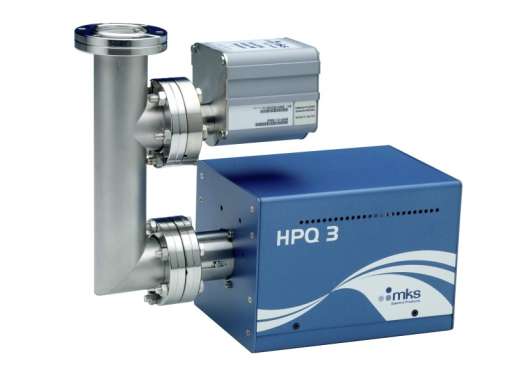Processövervakning
HPQ3S
High pressure 0.008 torr residual gas analyser
The HPQ3S residual gas analyzes allows operation up to 0.008 Torr without the need for differential pumping and uses application validated correction algorithms to compensate for the sensitivity variation arising from ion-molecule interactions in the ion source at higher pressures.
The field proven technology, coupled with the latest innovative Microvision 2 electronics, give data quality not previously seen in this class of instrument. The resulting system is less complex, with reduced installation requirements, offering a higher level of reliability at a substantially lower cost.
Key features
- Upper working limit of 0.008 Torr total pressure
- Leak detection of vacuum lines, coolant lines, welds, and seals
- Application validated correction algorithms to compensate for sensitivity variation
- Verify the quality of process gases
High pressure quadrupole analyser design
The new RF design in the HPQ3 covers the 1-100 amu mass range without compromising the quality of gas peak separation at very low mass or high mass. The field proven High Pressure Quadrupole analyser design in the HPQ3 retains the robust and inexpensive ion source design with dual filaments. This allows continuous uninterrupted operation without needing to regularly replace filaments before their normal expected lifetime. For specific higher pressure applications up to 1e-2 mbar the HPQ3S makes real-time corrections using a gauge pressure from the tool or by using a variety of optional independent gauges fitted to a custom F-Chamber designed for optimum performance with the HPQ3S.
Wide dynamic range detector electronics
The patented wide dynamic range detector electronics allow detection of single figure parts per million chamber leaks or contaminants, even when simultaneously measuring major gas peaks in the e-3 mbar range. This is possible in a single scan or peak jump data acquisition with less than 20 ms between the maximum and minimum signal levels and without the need for an expensive electron multiplier which needs frequent calibration and replacement.
- Prevents large peaks from causing false positive measurements on small peaks.
- Temperature stabilized critical components with improved signal stability and baseline drift allow the unit to be used without frequent recalibration if the vacuum chamber is stable but ambient air temperature fluctuates
- Variable sensor conditions to match the needs of each process under different pressure conditions
- Each optimized sensor configuration is separately stored in the RGA and automatically recalled or recalibrated by software recipes.
- Flexible digital and analog I/O capability with a dedicated gauge port as standard.
Built-in web server application
A web interface using industry standard technology allows set-up and control of the HPQ3 from anywhere on a network. Using a non platform-specific web browser, calibration, operation and saving real time data to an export format is all possible. Using the documented Software Developer’s Kit, ASCII protocol and TCP-IP communication, any third party software can send and receive commands and data from the HPQ3 and HPQ3S.
Process Eye Professional
A Windows-based comprehensive software platform offering complete control of all RGA parameters:
- Recipe driven control to allow the highest level of flexibility but with ease of use through the EasyView recipe and Recipe Wizard
- Ability to link to other systems through a variety of mechanisms such as Modbus, ASCII, SECS protocols, serial communications, TCP-IP, file exchange and many others
- Flexibility to run automatic and precisely-optimized data collection, alarm condition checking and closed loop control operation
TOOLweb® RGA
A specialized, turn-key tool-integration software package (PC or server based) providing optimized methods to get the most reliable information from RGAs and other sensors on process tools:
- Complete integration of RGA data with tool operation and FDC systems
- Levels of interdiction from passive monitoring of the tool vacuum, to process critical go/stop control of individual process chambers
- Powerful web based reporting provides process engineers with highly valuable information to keep tools running at peak efficiency from anywhere on the network


